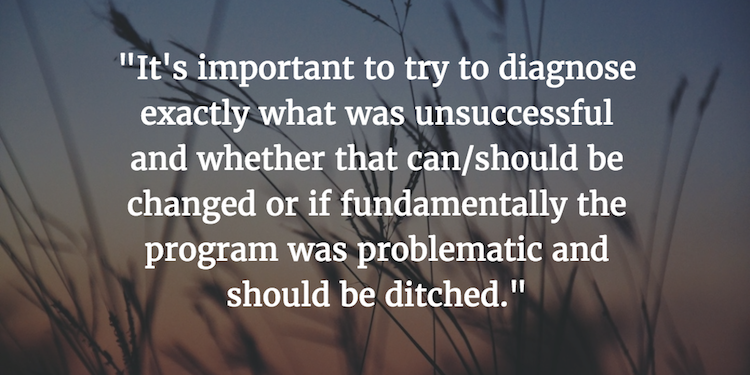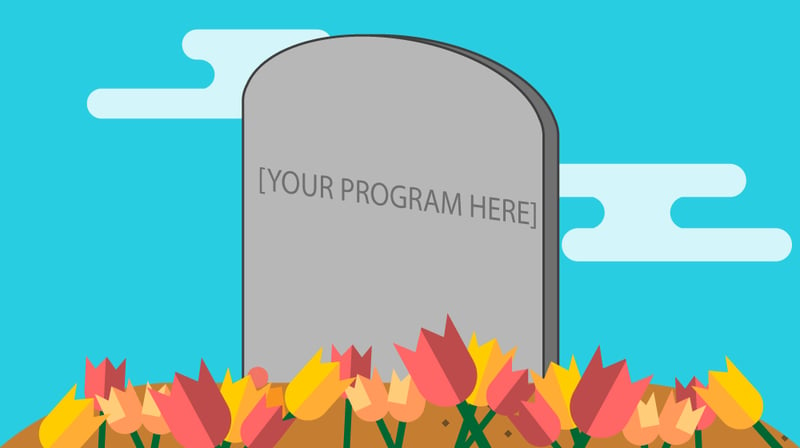We’ve all been there. High hopes for an event that turned out to be a flop. That feeling in your gut right before you’re about to meet with your supervisor to inform them of the not-so-great news.
Ask any student activities coordinator: There’s probably nothing more Earth-shattering than putting in countless hours of work to plan for an amazing program and then at the end, feel like it all wasn’t good enough.
As a former student affairs professional in residence life, I’ve seen a few failed programs in my day — I supervised a staff of seven, eight, and at one time, 14 resident assistants. They all had different ideas and concepts, and some programs just didn’t work out.
How do we know what truly went “wrong” at an event?
I’ve outlined some tips and tricks below to help you get to the root of the possible problem and strategies to plan more effective programs in the future.
The science behind feeling unsuccessful
Naturally, I looked to researchers and thought leaders to understand more about success and failure, and why sometimes it’s really hard to admit we’re wrong.
We are all about taking credit for our successes, however, we’re usually not the first to internalize our failures.
We often point fingers and blame external factors instead like, “the time of day” or say “there was another program going on.” It’s easy to get caught up in all of the other aspects that could have made your program suffer instead of looking at the inner workings and role you or your team had in preparing for the event.
Kathryn Shulz, author of Being Wrong and TED Talk speaker discusses how it feels to be wrong or unsuccessful, and how everyone makes mistakes in whatever job they may hold (even you)!
It’s human nature to feel compassionate towards others who make mistakes or those who didn’t see the whole picture when they were starting out. For example, maybe they underestimated the time to plan for an event and they left out a significant piece in making it successful the entire way through.
Shulz explains that our compassionate outlook changes when we ourselves make mistakes or feel wrong; we become hard on ourselves and suddenly don’t appreciate the “lack of success” or mistakes in our lives.
We’re taught at a young age to be successful in everything that we do. We’re taught to compare ourselves to others, and if we’re not up to snuff, we feel terrible. Throughout elementary school and high school we’re taught never to make mistakes and that the highest praised individuals will be most successful in life. However, that’s not necessarily true.
Defining success using project post-mortem
“Trusting too much in the feeling of being on the correct side of anything, can be very dangerous.”
We may call it intuition or we may call it “the feeling of being right,” but sometimes we have to admit that we don’t have all the answers — no matter how compelling they may feel to us.
Doing a project post-mortem can help us gain clarity around how we evaluate success.
Yes, it sounds a bit morbid and I promise you it’s not (in this case).
In terms of reviewing a program or event, Wikipedia defined it as,
“A process, usually performed at a conclusion of a project, to determine and analyze the elements of the project that were successful and unsuccessful … they encompass both quantitative and qualitative data.”
Here are some questions to consider asking during a post-mortem:
- What went well? What didn’t go well?
- Is there anything we should start doing? Stop doing?
- Is there anything we underestimated or overestimated?
Meeting briefly after each event, no matter large or small encourages transparency and relieves that fear of failure among your team. It’s a great way to strengthen culture and tackling conflicts head on by celebrating achievements and addressing concerns immediately.
During your post-mortem, you can also understand if the event was successful in terms of providing an amazing attendee experience.
Joe Levy, Director of Assessment at National Louis University explains the importance of reflecting on why the program was unsuccessful,

So, how are you specifically going to measure the success of an event?
Is your event successful because you got people to attend? (Hint: answer should be a hard “no” here)
If you’ve decided that you’d like to measure things like student engagement, which students were happy they attended, or which groups of students were most engaged — how exactly are you going to find that information?
Quantitative data around a program can be interpreted as collected student demographic attributes, number of students checked-in, and students who repeatedly attend programs. Qualitative data around a program can include student anecdotal evidence from professionals (videos, social media) and the utilization short open-ended surveys for students to fill out while at an event.
We’ve compiled 100 ways to assess an event that will help with process your post-mortem more effectively.
Take the time to understand what success looks like for your event, how you’re going to measure it, and how to celebrate those successes in the future.
It’s always important to build an atmosphere of reflection and realize that we can learn from our mistakes: After all, you will probably come to a moment in your life where you need to measure success.
Experiment, iterate your processes, measure, and evaluate your events!
How can you better define success around campus events?
What program have you had recently that felt unsuccessful? Why was it unsuccessful?
Tweet us @Hellopresence to continue chatting about how we define success around events!
P.S. If you enjoyed this post, you may enjoy this event-related post: 5 Things You Can Learn in the First 5 Minutes of An Event.





